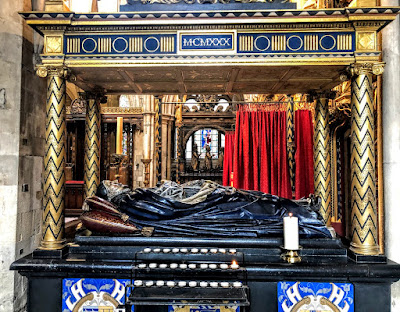The tomb of Bishop Lancelot Andrewes in Southwark Cathedral (Photograph: Patrick Comerford, 2022)
Patrick Comerford
Each time I visit Southwark Cathedral, one of the places I find myself stopping at is the tomb of Lancelot Andrewes (1555-1626), Bishop of Winchester.
Lancelot Andrewes was a bishop and scholar who played a key role in the translation of the Authorised Version or King James Version of the Bible. Although he worked mainly through the reigns of Elizabeth I and James I successively, he is counted as one of the early Caroline Divines, known for their scholarship and devotional writings.
He is to be read alongside Richard Hooker, George Herbert and Jeremy Taylor, and is also one of the literary giants of English literature, exercising a particular influence on the poet TS Eliot, who singled out the 17th century as the high point of Anglican theology.
For Walter Frere, he is the successor to John Jewel in defining the via media position of Anglicanism. For Kenneth Stevenson, he ‘is without doubt along with Hooker one of the two giants of the era in which Anglicanism took shape.’
His appeal to antiquity was characteristic of classical Anglicanism. Andrewes summarises doctrinal authority in memorable form: ‘One canon reduced to writing by God himself, two testaments, three creeds, four general councils, five centuries and the series of fathers in that period – the three centuries, that is, before Constantine, and two after, determine the boundary of our faith.’
He died at Winchester House, Southwark, on 25 September 1626. On the day he died, Archbishop William Laud wrote in his diary: “Monday, about 4 o’clock in the morning, died Lancelot Andrewes, the most worthy bishop of Winchester, the great light of the Christian world.” Milton later wrote a beautiful Latin elegy on the death of Bishop Andrewes.
John Buckeridge, Bishop of Rochester, preached at his funeral. He was buried by the high altar in the Church of Saint Mary Overie, then in the Diocese of Winchester but now Southwark Cathedral.
In the Church of England, he is commemorated with a Lesser Festival on 25 September.
Visiting the tomb of Lancelot Andrewes by the high altar in Southwark Cathedral a fortnight ago, I read this prayer:
Thou, O Lord, art the Helper of the helpless,
the Hope of the Hopeless,
the Saviour of them who are tossed with the tempests,
the Haven of them who sail; be thou all to all.
The glorious majesty of the Lord our God be upon us,
prosper thou the work of our hands upon us,
Oh! prosper thou our handiwork
Lord, be thou within us, to strengthen us;
without us to keep us; above us to protect us;
beneath us to uphold us; before us to direct us;
behind us to keep us from straying;
round about us to defend us.
Blessed be Thou, O Lord our Father, for ever and ever.


No comments:
Post a Comment